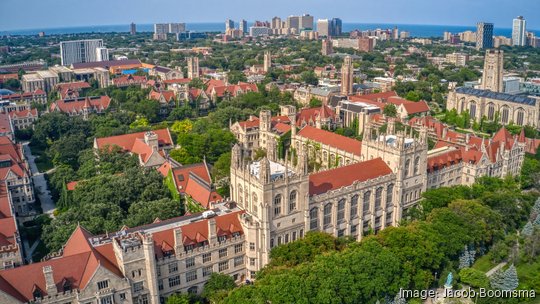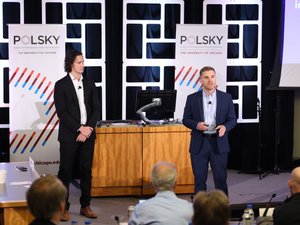
Local universities such as the University of Chicago and Northwestern University have made a concerted effort to bring in more entrepreneurial-minded staff and faculty, and tech and venture firms are starting to take notice.
For example, Vanqua Bio, a biotech startup that recently raised $45 million in new funding, decided to build in Chicago because founder and CEO Jim Sullivan wanted to be part of developing a robust life-science ecosystem here, he told Chicago Inno when the new funding was first announced.
It was also becoming apparent to him that the major universities here were recruiting faculty that were "quite entrepreneurial," which has made it easy to find great scientific talent for the company.
Dimitri Krainc, co-founder of Vanqua Bio, for instance, currently serves as chair of neurology at Northwestern.
He's hardly the only tech entrepreneur in the ecosystem who is dipping their feet in both ponds. This year's Inno Fire list, which highlights the 50 companies that we think are setting the local innovation economy ablaze, was filled with companies like Azul 3D, Flow Medical and Rhaeos that were co-founded by local faculty who are turning their research into businesses.
It's a process that Northwestern professor Chad Mirkin has done 11 times, including with clean chemistry company Mattiq.
"This isn't something that is just starting, but for the first time you're beginning to see inflow of money from the East and West Coast into the Midwest, and that was not true 30 years ago," he said.
Mirkin said launching a tech company in Chicago is night and day compared with five years ago — even more so compared with when he started 25 years ago — and a big part of that is the work being done at the university level.
"When I built my first company, I had to go over to Kellogg and start knocking on doors to find people that could help me write business plans," he told Chicago Inno. "Now we have an incredible bullpen of students and postdocs that can staff these companies."
Finding more 'investable' faculty
Mirkin — who is also director of the International Institute for Nanotechnology — said that the university's strategy has always been to "hire the best people."
"I don't go after people that I think are specifically entrepreneurial. I go after people that I think are the best in their particular field, and it just turns out in today's day and age, a good fraction of them have a good game when it comes to starting companies," he said. "From an educational standpoint, what better education than to be a part of something that you discovered that ultimately becomes a product that saves a life."
Samir Mayekar, co-founder and former CEO of Chicago tech company NanoGraf — who was recently named managing director of the University of Chicago's Polsky Center for Entrepreneurship and Innovation — similarly knows what it's like to take something out of the lab and turn it into a company. He said that following the success of the Covid vaccine, Ozempic and Manjaro, there's a greater appreciation of the importance of commercializing and translating great research.
And that appreciation is already starting to make an impact.
UChicago hit a record number of invention disclosures last year, and startup accelerator New Venture Challenge set records with the largest investment given to a single team and the largest investment pool in its 28-year history.
The universities aren't just bringing in "investable faculty," as John Flavin, founder and CEO of Portal Innovations, described it, but are also investing in the facilities that will help create a better pathway to commercialization for local innovation.
Portal Innovations, in partnership with UChicago, announced plans to open a new science incubator at Hyde Park Labs that will cater to earlier-stage companies, with infrastructure to support quantum, climate-tech and battery companies.
On the other end of the city, Northwestern was awarded $20 million from the National Science Foundation earlier this month to help accelerate technology innovations. The research program, led by faculty from both the Kellogg School of Management and the McCormick School of Engineering and Applied Science, will use an "innovation database" of faculty research discoveries combined with artificial intelligence tools to better identify new opportunities for innovation and to discover "research-to-market" pathways more quickly.
"The journey to translate research envisioned in the lab to adoption in the marketplace isn't easy, but it's part of our charge as scientists and business leaders," Christopher Schuh, dean of the McCormick School of Engineering, said in a statement.
Collaboration between universities
While the Polsky Center's Mayekar does think there is a deeper commitment to entrepreneurship with the newer generation of faculty coming in, he also said the increased collaboration between Chicago's universities such as Northwestern and UChicago has played a role in the ecosystem's latest momentum.
“When you look at two of the most robust innovation ecosystems: Boston/Cambridge and the Bay Area, you have these big institutions like Harvard and MIT churning out research, but you also have the Broad Institute of MIT and Harvard where they actually collaborate with health systems and work together to turn out a lot of venture-backed life-science companies," Mayekar said.
While historically there may have been more competition between the institutions, Mayekar said there’s a different spirit of collaboration in the air these days.
"Frankly, I’m a testament to that. I have two Northwestern degrees and am a former Northwestern trustee, and now I’m here at UChicago. I’m not sure that would have happened in a different era," he said.
Sign up for the Business Journal’s free daily newsletter to receive the latest business news impacting Chicago.







